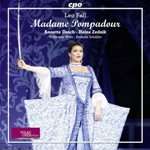|
Back
06/01/2014
Leo Fall: Madame Pompadour
Annette Dasch (Madame Pompadour), Heinz Zednik (The King), Mirko Roschkowski (René), Elvira Soukop (Madeleine), Beate Ritter (Belotte), Boris Pfeifer (Joseph Calicot), Gerhard Ernst (Maurepas), Wolfgang Gratschmaier (Poulard), Georg Wacks (Collin), Marian Olszewski (Boucher), Mamuka Nikolaishvili (Tourelle), Joachim Moser (Austrian Messenger), Karin Gisser (Caroline), Christiane Costisella (Léonie), Heike Dörfler (Valentine), Lidia Peski (Amélie), Clemens Bauer (Lieutenant), Orchestra and Chorus of the Volksoper Wien, Stage Orchestra of the Vienna State Opera, Thomas Böttcher (Chorus Master), Andreas Schüller (Conductor)
Recording: Volksoper Wien (June 2012) – 77’24
cpo # 777 795-2 – Booklet in German and English

   
It’s hard to imagine why Leo Fall’s works are infrequently performed nowadays for the Moravian born composer released numerous successful operettas for the theatrical stage at the turn-of-the-century. In 1907 the three act operetta, Die Dollarprinzessin (Read here), premiered in Vienna, going on to be one of the most popular throughout the world. A heavy favorite in The United States, the work pivoted around a widowed American millionaire featuring the highly novel opening of a women’s chorus singing and using typewriters as a percussive backdrop. Fifteen years later Madame Pompadour (1922), Fall’s penultimate work, set the stage ablaze with its saucy proportions, becoming the composer’s greatest hit in post World War I.
Because Madame Pompadour is categorized as an operetta, cpo decided to pluck out the majority of verbal dialogue (save a few stands), thereby leaving music in toto which runs slightly over one hour. Leo Fall’s music is a festive bowl of jaunty numbers: bright, bouncy, fervently happy and possessive of zesty snaps. It’s obvious the entire cast had room for enjoyment for all slap-stick and hilarious shenanigans can be heard in this live recording. The sound is rich and exceptionally pleasing.
After a delightful “Ouvertüre”, a pastiche of soon-to-be-heard musical numbers, the operetta opens with Joseph Calicot (Boris Pfeifer) satirizing Madame Pompadour who is the king’s mistress. The high pitched tenor chirps away at his notes with irritating impudence, making him Madame’s comical buffoon antagonist. We are introduced to Annette Dasch in the title role whose soprano voice is broad and wholesome, tinged with a bit of brassiness. She’s much more at home in the lower notes, yet she manages to nicely pull off a high E flat in Act I’s “Finale” that’s spot-on, yet soft and short. The soufflé “Duet” features Mirka Roschkowski’s (René) precision notes in an amorous discourse with Dasch that brings to mind Lehar’s Die lustige Witwe.
The chorus sings with bouncy aplomb, particularly in the “Laridi, laridon, laridallera” that segues into the snappy march-like rhythms of “Rataplan, rataplan, rataplan” with alternating ¾ weaves.
Act II contains elements of Hungarian-like spiciness: the Pompadour/Calicot “Duet” has resemblances to Die Csárdásfürstin (1915) with intersperses of a five note sequence that makes one think we’re getting ready to jump into Bizet’s “Fate motif” from Carmen. The “Serenade” surrounding Madame Pompadour and René shines with lilting, distant Offenbachian swells akin to Dappertutto’s aria, “Scintille, diamant” from Les Contes d’Hoffmann. The duet ends with Roschkowski holding onto a high A that floats into the sky. “Lied der Pompadour” is an alluring number whereby we find Dasch suggestively singing in a quasi recitativo secco mode using a stringed instrument (fortasse guitar) as the basso continuo.
The enclosed liner notes have several photos of the 2012 production showing visual opulence in costuming and set design. There’s even a life like mannequin of Madame Pompadour that engulfs the set in Act II with whimsical Magritte-like imagery. Andreas Schüller leads a fine and well-rehearsed orchestra with textural percussive accoutrements.
Christie Grimstad
|